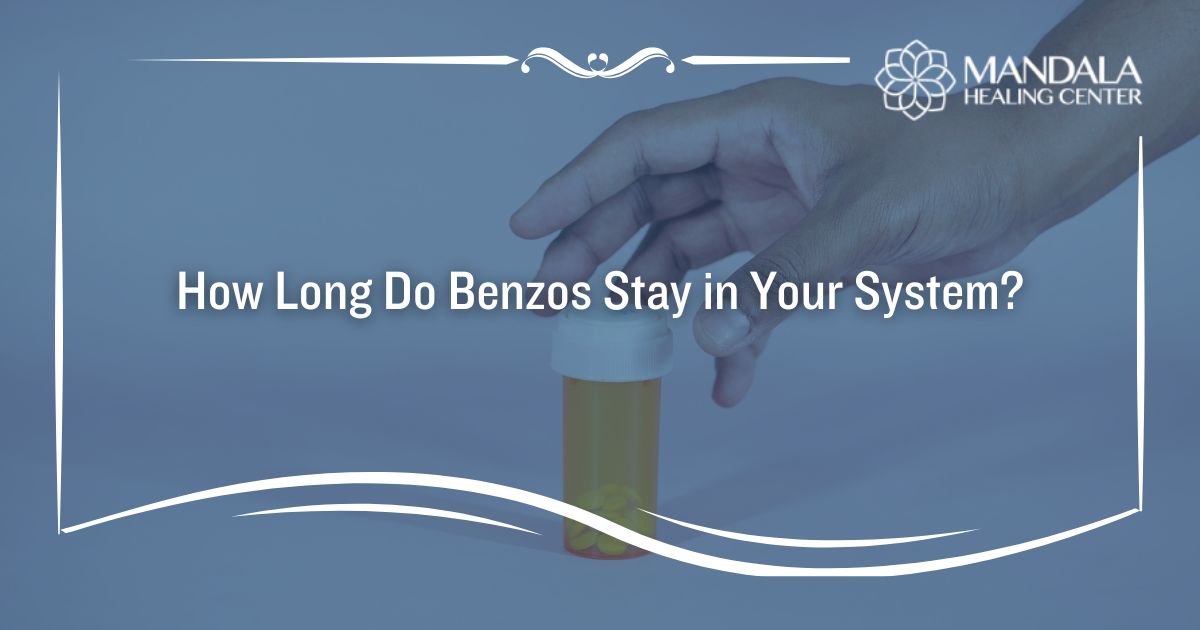Benzodiazepines are a class of drugs that calm the central nervous system. They also influence a chemical in your brain known as gamma-aminobutyric acid (GABA), which leads to feelings of relaxation.[1] Due to their effects, benzos are often used to treat anxiety and manage seizures.
While benzos have legitimate medical uses, they are not meant to be used long-term. Using benzos longer than they are prescribed or in higher doses can lead to addiction. Unfortunately, benzodiazepine addiction must be treated by a professional rehab program.
If you or a loved one struggles with benzo addiction, you might be wondering how long they stay in your system. The amount of time a benzodiazepine will remain in your body depends on which benzo you took, the speed of your metabolism, frequency of use, overall health, liver function, and more.
That said, short-acting benzodiazepines have a half-life of 1 to 12 hours, which means they can stay in your system for up to 60 hours. Long-acting benzos have a half-life of 40 to 150 hours, allowing them to remain in your body for 8 to 30 days.[2]
In this article, you will learn:
- What are benzodiazepines?
- How long do benzos stay in your system?
- How long can drug tests find benzos in your system?
What are Benzodiazepines?
Benzodiazepines are prescription medications that cause sedation, relaxation, and calmness. They are commonly prescribed to treat anxiety, seizures, insomnia, and even alcohol withdrawal. To receive a benzodiazepine, you have to visit a medical professional and be diagnosed with a qualifying condition.
Even if you are prescribed a benzodiazepine, they are only intended for short-term or occasional use. Using them long-term or regularly could lead to physical dependence and addiction.
Examples of benzodiazepines include:
- Xanax (alprazolam)
- Klonopin (clonazepam)
- Ativan (lorazepam)
- Valium (diazepam)
- Librium (chlordiazepoxide)
- And more
If you or a loved one develops an addiction to a benzodiazepine drug, you should seek help from a professional rehab center. These programs offer services like medical detox, evidence-based therapies, and relapse prevention planning to help you recover long-term.
How Long Do Benzodiazepines Stay in Your System?
Many factors play a role in determining how long benzodiazepines stay in your system. First, you have to look at whether you are taking a short–, intermediate-, or long-acting benzodiazepine.
Short-acting benzodiazepines have a half-life of 1 to 12 hours, which means they can stay in your system for up to 60 hours.[2] Examples of short-acting benzos include Versed and Halcion.
Intermediate-acting benzodiazepines have a half-life of 12 to 40 hours.[2] They can stay in your system for up to 8 days. Examples of intermediate-acting benzos include Xanax, Ativan, Klonopin, and Restoril.
Long-acting benzodiazepines have a half-life of 40 to 250 hours.[2] They can remain in your system for 8 to 30 days. Examples of long-acting benzos include Valium, Librium, Tranxene, and Dalmane.
Other factors that influence how long benzos stay in your system include:
- Age, weight, and biological sex
- Overall health and functioning of the liver or kidneys
- Rate of metabolism
- Frequency and duration of use
- Dosage consumed
- Hydration and nutrition levels
How Long Can Drug Tests Detect Benzos?
As stated, the type of benzo can influence how long it stays in your system. This means that Xanax might have a different detection window than Klonopin or Ativan. It also depends on the type of test being used.
Urine
Urine tests are the most commonly used drug tests because they are minimally invasive and cheap to use. You might take a urine drug test at a probation office, in a drug rehab program, or before being offered employment at a job.
Drug tests can detect benzos in urine for 24 hours if short-acting. Intermediate-acting benzos can be found in urine for 1 to 5 days after your last dose and long-acting versions can cause you to test positive for 5 to 8 days.
If you engage in chronic benzodiazepine use, you might test positive on a urine sample for up to 30 days after your last dose.
Blood
Blood testing is not as reliable as urine screening and they tend to offer a shorter window of detection. That said, medical professionals might use blood tests when you are in the hospital.
Most of the time, benzodiazepines will only cause a positive result for 12 to 24 hours after your last dose.
Hair
Hair tests offer the longest window of detection, however, they can provide discriminatory results. Hair tests might discriminate based on things like hair color, making them unreliable. Despite this, some high-security clearance jobs use them before offering employment.
Hair tests can find benzodiazepines in your system for up to 90 days after your last dose.
Get Connected to a Benzo Addiction Treatment Center
If you or a loved one suffers from benzo addiction, it’s time to seek professional help. Withdrawal from benzodiazepines can be painful and even life-threatening, making it vital that you have access to medical detox services. Thankfully, the Mandala Healing Center can support you through withdrawal and the early stages of recovery.
Contact us today for more information on our benzodiazepine addiction treatment center.
References:
- Science Direct: Benzodiazepine interactions with GABA receptors
- Research Gate: Benzodiazepine Pharmacology and Central Nervous System–Mediated Effects
















